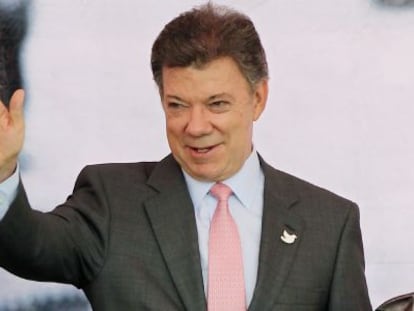Colombian government and FARC resume peace talks
Both sides manage to overcome the crisis caused by kidnapping of General Alzate

The Colombian government and the Revolutionary Armed Forces of Colombia (FARC) have decided to resume peace talks after a 17-day break to resolve the crisis that arose after an armed group kidnapped General Rubén Darío Alzate and two other people in the jungle in Chocó.
In a joint statement published on Tuesday night, both parties agreed to hold the next round of talks between December 10 and December 17 and to focus on moving forward on reducing armed clashes, an issue that has come to the forefront of the debate since the general’s abduction on November 16. Although both sides agreed to carry out the peace process while the armed conflict continued, they now say it is time to curb offensives as a peaceful gesture. “The goal is to move forward on scaling back the conflict in order to reach an agreement as soon as possible on this issue,” the statement said.
The communique also said the parties have established a “permanent mechanism” to allow the facilitators of the peace process – Cuba and Norway – to participate so that they may “help solve eventual crises that might arise in the future.” This provision is a method to prevent interrupting the talks over events such as the kidnappings of Alzate, three other soldiers and a Defense Ministry contract lawyer.
The goal is to move forward on scaling back the conflict in order to reach an agreement”
Alzate was freed last Sunday thanks to Cuba and Norway’s mediation and the participation of the International Committee of the Red Cross after President Juan Manuel Santos said he would not resume talks until the general was freed. Santos made a unilateral decision, which created some tension between the government and the rebel group. FARC leaders said his demand contradicted his own request to hold negotiations without a ceasefire on both sides. Yet, with the help of the facilitators, the rebels and Santos immediately reached an agreement to free the captives – though not before calling for a review of the rules of negotiation as a condition to reopen dialogue. On Tuesday and Wednesday, the group, which has been meeting in Havana for the last two years, discussed guidelines.
General Alzate and two soldiers were abducted in Arauca province on the border with Venezuela. The incident stirred indignation in the neighbor country, weary as it is of this calamity even though it supports – with reservations – this new attempt to put an end to a 50-year-old conflict between the Colombian state and the rebels.
Hours after the general’s release, Santos insisted that negotiating as the conflict goes on “has its costs”
Hours after the general’s release, Santos insisted that negotiating as the conflict goes on “has its costs.” He lamented and condemned “the death of soldiers, police officers, children, men and women.” Even so, he stressed his belief that negotiating while the conflict went on was the best way to avoid taking up conversations “that would turn into an endless exercise.”
Meanwhile, the general resigned from the army. He acknowledged that his kidnapping was the result of his own imprudence: he failed to take a security detail with him.
Still, the parties have now overcome the crisis, the statement said, though negotiations from now on will not be the same. The measures announced give the talks an urgency, especially since some are calling on the rebels to make some peaceful gestures as a way to build more public support for the process. After this new round of discussions, including the negotiators’ meeting with the fifth and last delegation of victims on December 16, they will meet again in mid-January. The exact date is yet to be determined.
Translation: Dyane Jean Francçois
Tu suscripción se está usando en otro dispositivo
¿Quieres añadir otro usuario a tu suscripción?
Si continúas leyendo en este dispositivo, no se podrá leer en el otro.
FlechaTu suscripción se está usando en otro dispositivo y solo puedes acceder a EL PAÍS desde un dispositivo a la vez.
Si quieres compartir tu cuenta, cambia tu suscripción a la modalidad Premium, así podrás añadir otro usuario. Cada uno accederá con su propia cuenta de email, lo que os permitirá personalizar vuestra experiencia en EL PAÍS.
En el caso de no saber quién está usando tu cuenta, te recomendamos cambiar tu contraseña aquí.
Si decides continuar compartiendo tu cuenta, este mensaje se mostrará en tu dispositivo y en el de la otra persona que está usando tu cuenta de forma indefinida, afectando a tu experiencia de lectura. Puedes consultar aquí los términos y condiciones de la suscripción digital.









































